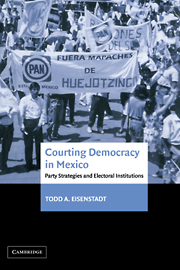Book contents
- Frontmatter
- Contents
- Figures and Tables
- Acknowledgments
- Courting Democracy in Mexico
- 1 Electoral Courts and Actor Compliance: Opposition-Authoritarian Relations and Protracted Transitions
- 2 Ties That Bind and Even Constrict: Why Authoritarians Tolerate Electoral Reforms
- 3 Mexico's National Electoral Justice Success: From Oxymoron to Legal Norm in Just over a Decade
- 4 Mexico's Local Electoral Justice Failures: Gubernatorial (S)Election Beyond the Shadows of the Law
- 5 The Gap Between Law and Practice: Institutional Failure and Opposition Success in Postelectoral Conflicts, 1989–2000
- 6 The National Action Party: Dilemmas of Rightist Oppositions Defined by Authoritarian Collusion
- 7 The Party of the Democratic Revolution: From Postelectoral Movements to Electoral Competitors
- 8 Dedazo from the Center to Finger Pointing from the Periphery: PRI Hard-Liners Challenge Mexico's Electoral Institutions
- 9 A Quarter Century of “Mexicanization”: Lessons from a Protracted Transition
- Appendix A Coding the Postelectoral Conflict Dependent Variable
- Appendix B Coding of Independent Variables
- Bibliography
- Index
Appendix B - Coding of Independent Variables
Published online by Cambridge University Press: 22 September 2009
- Frontmatter
- Contents
- Figures and Tables
- Acknowledgments
- Courting Democracy in Mexico
- 1 Electoral Courts and Actor Compliance: Opposition-Authoritarian Relations and Protracted Transitions
- 2 Ties That Bind and Even Constrict: Why Authoritarians Tolerate Electoral Reforms
- 3 Mexico's National Electoral Justice Success: From Oxymoron to Legal Norm in Just over a Decade
- 4 Mexico's Local Electoral Justice Failures: Gubernatorial (S)Election Beyond the Shadows of the Law
- 5 The Gap Between Law and Practice: Institutional Failure and Opposition Success in Postelectoral Conflicts, 1989–2000
- 6 The National Action Party: Dilemmas of Rightist Oppositions Defined by Authoritarian Collusion
- 7 The Party of the Democratic Revolution: From Postelectoral Movements to Electoral Competitors
- 8 Dedazo from the Center to Finger Pointing from the Periphery: PRI Hard-Liners Challenge Mexico's Electoral Institutions
- 9 A Quarter Century of “Mexicanization”: Lessons from a Protracted Transition
- Appendix A Coding the Postelectoral Conflict Dependent Variable
- Appendix B Coding of Independent Variables
- Bibliography
- Index
Summary
VARIABLES TESTED IN MODEL ALL T
Social Conflicts Index
This variable was an index composed of: (1) human-rights assessments for the middle years of the period under study (measured by state), (2) agrarian conflicts per capita as taken from the November 1998 “cut” of complaints filed to the federal Attorney General for Agrarian Issues, measured starting in 1992, and (3) from compilation of “citizen demands” for the six months preceding each election.
The human-rights assessments were compiled from national media (Reforma/El Norte, and El Financiero on CD-ROM) and an April 1999 “cut” of the “Heriberto Jara” Center for Municipal Services (CESEM) Base Hemerográfica de Acontecer Municipal de México, 1994–1998. While none of these sources continuously covered the period under study (leading me to a more specific municipality-by-municipality measure using local press), there was sufficient overlap for the years 1993 through 1995 for me to average them. Incidents of human-rights abuses (excluding prison uprisings and domestic violence) were coded as follows: one for intimidation, violent confrontation (but without serious injury), or detainment, as of a journalist; two for disappearance, serious injury, and reports of torture; three for one death; four for multiple deaths; five for five to twenty deaths; ten for more than twenty deaths. An effort was made not to duplicate incidents across sources. This state-level measure was weighted as 50 percent of the value of the “Social Conflicts Index.”
Information
- Type
- Chapter
- Information
- Courting Democracy in MexicoParty Strategies and Electoral Institutions, pp. 295 - 306Publisher: Cambridge University PressPrint publication year: 2003
